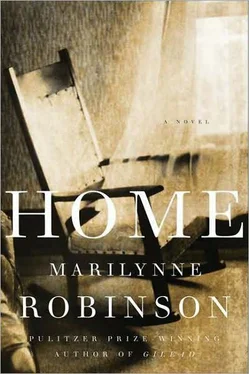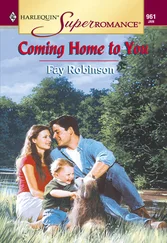“Not a thing.”
He nodded. “The fellow writes well, though. The elephants were very interesting.”
THE DAY SEEMED TO BE PASSING IN THE WAY THAT HAD become customary, Glory tending to household things while her father slept and Jack made himself useful around the place, making small, patient inroads on dishevelment and disrepair. Or so she assumed. Then she realized that she hadn’t seen him for a while. Usually he found some reason to speak to her from time to time, to joke with her a little, as if to assure himself again that she was kindly disposed toward him. She looked out at the garden, then she walked to the shed, looked into the barn. Jack was nowhere to be found. This is ridiculous, she thought. I can’t worry this way. An hour passed, then two. She had glanced through the mail and the new Life magazine. She had answered letters from Dan and Grace. Then the screen door closed and there was Jack, coming through the porch, looking disheveled and yet a little pleased with himself. He was in his undershirt, having made his shirt into a bundle of some kind which he set on the table and opened. “Mushrooms!” he said. “Morels! Right where they always were!” Sand and leaf mold and that musky smell.
“Where were they?”
“In a remote area, my dear. Far from the haunts of men.”
“Honestly! I’m your sister! Your only friend in the world!” “Sorry. No dice. Just look at these beauties. We eat mushrooms tonight, Glory!”
“What is that?” their father called. “What are we talking about?”
Glory said, “Go show Papa. He loves morels.”
“I think I’d better clean up a little.”
“You don’t have to clean up. Just go show him.”
So Jack carried the bundle into his father’s room and spread it open on the old man’s lap. “Ah,” his father said. “Ah yes. You’ve been out foraging.” He drew a deep breath and laughed. “‘See, the smell of my son is as the smell of a field which Jehovah hath blessed.’ Morels. Dan and Teddy used to bring me these. And blackberries, and walnuts. And they’d bring in walleye and catfish. And pheasants. They were always off in the fields, down by the river. With the girls it was always flowers. So long ago.”
Jack stood back and watched the old man study the mushrooms, sniff them, turn them in the light. He rubbed his bare arms as if he felt the way he looked, thin, exposed. He said softly, “Bless me, even me also.”
“No,” his father said, “that’s Esau. You’re confusing Esau and Jacob.”
Jack laughed. “Yes, I am the smooth man. How could I forget? I’m the one who has to steal the blessing.”
His father shook his head. “You have never had to steal one thing in your entire life. There was never any need for it. I have been searching my memory on that point.”
Glory said, “Papa, while I was in the hardware store the other day—”
But Jack said, “No, don’t. Don’t.” And smiled at her, and she knew she had come near shaming him. He had not robbed the dime store. How painful for this weary man to need exoneration from the mischief of bad children. “So good to be home,” he said to her afterward. “No place like it, the old song says.”
“Can I get something for you? Coffee?”
“Sure. Coffee. Why not?” He said, “You are a good soul, Glory. That fellow who did not marry you was a very foolish man.”
She shrugged. “Not altogether. He was a married man.”
“Oh.”
“So he said.”
“Oh.”
“Of course I didn’t know it at the time. Particularly.”
He laughed. “Particularly.”
“You know what I mean. I could have figured it out if I’d wanted to.”
He nodded. “Ah, that’s hard. I’m sorry.” After a moment, “And no child was born of this union, I take it.”
She shook her head. “No.”
“So you were spared that, at least.”
She drew a deep breath.
He said, “I’m sorry! Why did I say that? Why don’t I just stop talking? Why don’t you tell me to stop?”
“Well, Jack, you didn’t know her. So I suppose it isn’t surprising that you’d think about her that way. As something we might have wished to be spared.”
“Yes, the little girl.”
“Your little girl.”
“My little girl.” He stood up. “I’m not much good at — I stayed away all that time — it was the best I could do—”
“That’s not what I mean. I mean we’re glad she was born. We enjoyed her life. I believe she enjoyed it, too. I know she did.”
He put his hand to his face. “Thank you. That’s good to know, I suppose. I’m probably saying the wrong thing — I’ve never known how to deal with this. Shame. You’d think I’d be used to it.”
“But I’m trying to tell you, there was so much more than shame in all that, or wrongdoing or whatever. Anyone could have been proud of her. That’s what I tried to say in those letters I sent you.”
“Oh. Then I guess I should have read them.” He laughed. “Dear God,” she said. “Dear God in heaven, I give up. I throw up my hands.”
“Please don’t say that, Glory. I’m alone here—”
“Well,” she said, “you know I don’t mean it.”
After a moment he said, “Why don’t you mean it?”
“Well, I’m your sister, for one thing. And for another thing—” He laughed.
“—I’m your sister. That’s reason enough.”
He nodded. “Thank you,” he said. “That’s very kind.”
JACK HAD ADDED TO THE GARDEN, SUNFLOWERS AND SNAPdragons and money plants, several hills of cantaloupe, a pumpkin patch, three rows of corn. He rescued the bleeding-heart bushes from a tangle of weeds and tended the gourds with the tact of a man who believed, as all Boughtons did, that they throve on neglect. When her brothers and sisters were children they had made rattles of the gourds when they dried, and bottles and drinking cups, playing Indian. They had carved pumpkins and toasted the seeds. They had pretended the silver disks of money plants were dollars. They had pinched the jaws of snapdragons to make them talk, or pinched their lips closed to pop them. They had eaten the seeds of sunflowers when they were ripe and dry. They had opened the flowers of bleeding hearts to reveal the tiny lady in her bath. Corn on the cob they had all loved, though they hated to shuck it, and they had all loved melons. Jack tended these things with particular care. When he was restless he would sometimes walk out into the garden and stand there with his hands on his hips, as if it comforted him to see their modest flourishing. Once, when he saw her looking at it all, he said, “Have I forgotten anything?”
“No, I don’t believe you have.”
“I’m no farmer,” he said, clearly pleased that his crops were doing well enough just the same.
His father watched from the porch day after day and asked him what it was he was planting, and then whether the corn was up and the sunflowers, and whether the melons were setting on. Jack brought him a sprig of bleeding heart, the bud of a pumpkin blossom.
“Yes,” the old man said, as he did when memory stirred. “Those were good times.”
ONE EVENING JACK CAME IN FROM THE LATE TWILIGHT while Glory was settling her father for the night. They heard him in the kitchen getting himself a glass of water. The air had cooled. Insects had massed against the window screens, minute and various, craving the light from the tilted bulb of her father’s bedside lamp, and the crickets were loud, and an evening wind was stirring the trees. It always calmed her to know Jack had come inside for the night. She knew he would be propped against the counter, drinking good, cold water in the dark, the feel and smell of soil still on his hands. But her father was restless. He had something in mind, an intention he meant to act upon even in violation of this sweet quiet. He said, “I want a word with him. If you wouldn’t mind, Glory.”
Читать дальше












